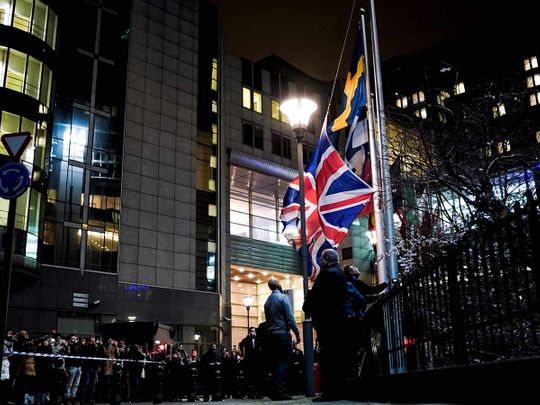
London: The UK begins life outside the European Union burdened by economic ills that have gone unresolved for more than a decade.
From anaemic growth to wage stagnation, the problems broadly come down to the abject weakness of productivity since the financial crisis. Each hour worked today is delivering just 2 per cent more economic output than it did at the end of 2007, making Britain one of the worst performers among Group of Seven nations.
The challenge is not lost on Prime Minister Boris Johnson, who has pledged to lift growth to pre-crisis rates and “level up” underperforming regions of northern England and the Midlands. But there is no quick fix, as the Bank of England vividly illustrated on Thursday when it delivered the biggest downgrade to its forecasts since the aftermath of the Brexit referendum in 2016.
Wage packet
Nowhere has the productivity malaise been felt more keenly than in wage packets.
Living standards are only now returning to the levels they reached in early 2008. Had real earnings instead maintained their pre-crisis trend, the average worker would be more than £7,000 (Dh33,945 or $9,200) a year better off today.
A tight labour market should sustain nominal earnings growth above 3 per cent — faster than inflation — but a return to the pre-crisis average of close to 5 per cent is unlikely.
Britain has relied heavily on a plentiful supply of labour to drive the economy, with more than 3 million jobs created over the past six years. Many people, including older employees, found themselves needing to work to make up for the squeeze on earnings. Now there is little slack left and post-Brexit immigration curbs could exacerbate the shortage of potential workers. Faster economic growth will require companies to get more out of their existing staff.
Johnson is throwing off austerity and preparing to spend in an effort to galvanise growth. If he delivers on his election pledges, the economy could get a significant fiscal stimulus equal to more than 1 per cent of GDP next year. Much of it will come in the form of extra infrastructure spending, which does more to lift output than money spent on public services. The government is hoping to kick-start private investment that has been on hold amid the uncertainty over Brexit. All eyes will be on Chancellor Sajid Javid’s March 11 budget.
Johnson won the election by persuading working-class, pro-Brexit voters in traditional Labour heartlands to back his Conservative Party for the first time. As he attempts to shift the political agenda away from looming trade talks with the EU and toward domestic issues, the premier is promising to tackle the wide disparities between regions. London and southeast England significantly outperform other parts of the country, with the productivity gulf no narrower than it was in 2008.
With characteristic exuberance, Johnson says his goal is to “unleash Britain’s potential.” His critics fear the country could be left in the past if Brexit damages commerce with its biggest trading partner and deprives the economy of productivity-enhancing foreign skills, innovation and investment.












